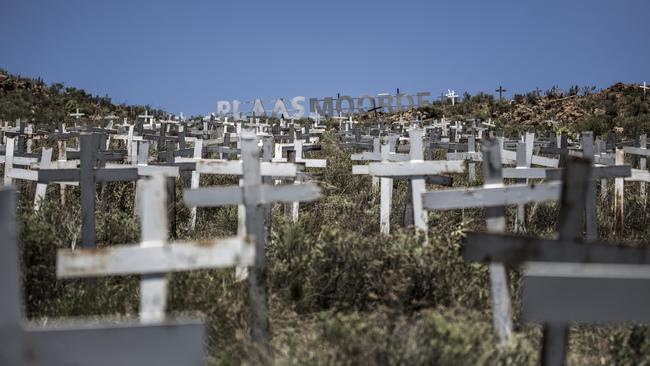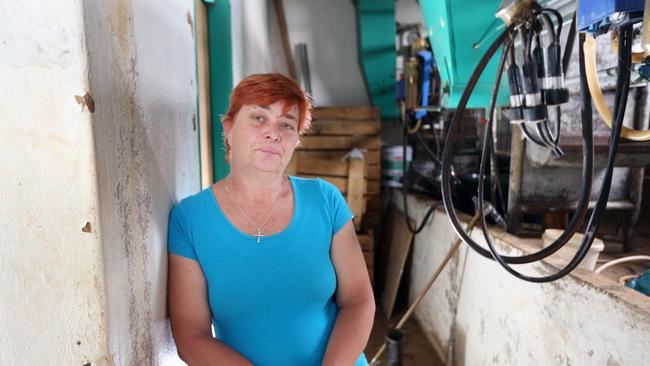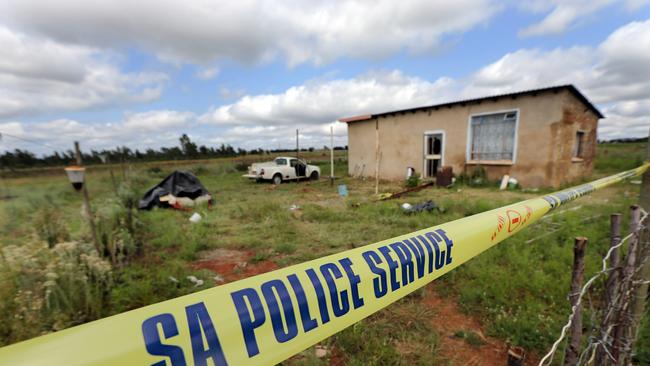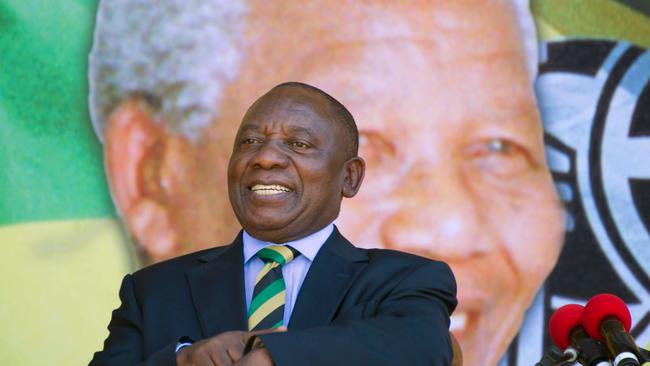White farmers in the firing line over land grab
South Africa risks repeating the Zimbabwe farming disaster as Cyril Ramaphosa plans to expropriate white-owned land.

The mellifluous tones of South Africa’s multi-millionaire new President are intended to be reassuring.
“There will be no smash and grab of land in our country,” says Cyril Ramaphosa, a mineworkers’ union leader under white rule who became a highly successful businessman post-apartheid before being elected leader of the ruling African National Congress in December last year.
“There is no reason for any one of us to panic and start beating war drums,” he says. “We are going to handle this matter in the way we’ve always handled difficult issues in our country — by dialogue, discussion, engagement, until we find good solutions that take our country forward.”
After the years of gross misgovernment and overweening corruption under his predecessor Jacob Zuma, many want to believe Ramaphosa when he says his government’s dramatic decision, following an overwhelming vote in favour in the Cape Town parliament, to begin a process of expropriating land without compensation is not what it seems.
In particular, Ramaphosa’s words are aimed at calming growing fears over land expropriation and redistribution among the five million-strong white minority.
Persuading that all will be well, however, is not easy. Memories of Robert Mugabe’s mind-numbingly stupid expulsion of white farmers from their land in neighbouring Zimbabwe, something that impoverished a country that was “the breadbasket of Africa”, are still fresh.
The images of white Zimbabwean farmers and their terrified families fleeing the violence of Mugabe-inspired black mobs, their homesteads ablaze and vital food crops destroyed, still linger. So does the heart-wrenching reality that, having expelled the white farmers, the political cronies to whom Mugabe handed over the once highly efficient farms have mostly shown themselves incapable of maintaining them as productive entities, instead allowing the jungle to reclaim the land while Zimbabweans starved.
Now, with the nonagenarian Mugabe ousted in a quasi-military coup and replaced by his long-time henchman Emmerson Mnangagwa, Zimbabwe is trying to make it up to the 4500 white farmers cruelly driven off their land. The small number who managed to hang on, maybe no more than 200, have been offered 99-year leases by the new government. As well, a very small number of white farmers — maybe no more than a half-dozen — who were expelled have been allowed back.
Having watched all this, nervousness about where South Africa is headed following a decision by the African National Congress at its party convention last December to embark on a program of “expropriating land without compensation” is inevitable.
Overshadowing it is the grim reality — little known outside South Africa — that since apartheid ended in 1994, white farmers, the backbone of the vital agricultural sector that provides the food for the country’s 56.5 million people — have been targeted in a sustained onslaught in which there were 400 attacks on farms in the past year alone, and one or two farmers were killed every week.

Many of these killings are part of the horrifying daily toll of 52 murders a day that occur across South Africa, one of the world’s highest murder rates. But with so many farmers being targeted, sometimes by black gangs armed with AK-47 assault rifles and other sophisticated weaponry, it is not hard to understand claims that there is a concerted move to drive them off their land.
As Paul Toohey has reported for the news.com.au website after a visit to South Africa, some of the violence that accompanies these attacks is “so abnormally cruel that many whites feel certain they are being sent a message to leave the land … holes drilled through the feet of elderly women. People burned alive. Women raped and bashed. Men shot dead in front of their wives and children.”
He talks of “an orchestrated terror campaign”, and provides horrifying accounts such as that of 60-year-old Nicci Simpson, who “had her foot run through with an electric drill by men torturing her for her safe’s combination”. Or 50-year-old Bernadette Hall, who refuses to leave her farm 70km south of Johannesburg despite witnessing her husband, David, being shot dead on their property.
Amid such reports it is not difficult to see why the manner and circumstances of the ANC government’s sudden embrace of a program of land expropriation without compensation is causing the panic and apprehension that Ramaphosa says is unjustified.
The South African government’s annoyed response to Australian Home Affairs Minister Peter Dutton’s mention of possible “special attention” for South African farmers who may want to migrate to Australia shows just how sensitive it is to criticism of the planned land grab.
Dutton says he has asked his department to explore whether they can be given refugee or humanitarian visas, in doing so arguing they need help from a “civilised country like ours”.
Unsurprisingly, the South African foreign ministry has rejected his intervention, saying that no “threat” exists. “There is no reason for any government in the world to suspect that a section of South Africans is under danger from their own democratically elected government,” it says in rejecting Dutton’s statement.
The undeniable reality is, however, that by embracing the “land expropriation without compensation” policy and using its overwhelming majority to get it through parliament, the ruling ANC, under its new leader, has drawn fire for going along with the demands of an increasingly influential fringe party known as the Economic Freedom Fighters, led by former ANC youth leader Julius Malema.
Malema, with his militant brand of hardline left-wing politics, has been making the running on the policy now adopted by the ANC. Ignoring the reality, as The Wall Street Journal has pointed out, that no country has ever become rich through its government’s seizure of private property, Malema’s mantra is that the South African state should be the “custodian” of all the country’s property. The corollary of that, he says, is that government expropriation of land and its redistribution will “restore the dignity of our people without compensating the criminals who stole our land”.
Malema says “we are cutting the throat of whiteness”, and in his fervent campaign aimed at achieving land expropriation clearly aimed at South Africa’s white farmers, he is joined not just by the ANC but also groups such as Black Land First, which has warned black South Africans against buying the estimated 20,000 farms for sale. “All the land in white hands is stolen property,” it says, going further than the ANC, which now speaks in terms of expropriating land “taken under colonialism and apartheid”.
The urgency of the politics that have led the ANC, the party of Nelson Mandela and his noble drive for reconciliation between the races and different ethnic groups after the ravages of decades of apartheid, are not difficult to appreciate. The ruling party is on the nose. It has lost the magic of the revered Mandela and his dreams for the future.
Recent elections have shown it to be in trouble — or, rather, it was in trouble under Zuma. The headway made by the disaffected Malema’s EFF party shows that. So do recent inroads by the opposition Democratic Alliance, which has deposed the ANC from control of cities such as Johannesburg and opposes land expropriation.
Twenty-four years after the defeat of apartheid, there is a remarkably rich and powerful black elite and a growing middle class. But millions of other black South Africans are little better off in an economy where the unofficial unemployment rate is probably well more than 30 per cent.

In this environment, Malema’s nationalistic calls for land expropriation have resonance that the ANC could not ignore even if it wanted to.
Hence its embrace of Malema’s ill-thought-out dictum. Even the moderate Ramaphosa, while trying to soothe anxious nerves, says “the ANC will take back the land and return it to the people, just as the organisation’s forefathers would have wanted.
“We are saying that land will indeed be returned.
“We are going to take that land and put it in the hands of our people, whether they like it or not. That is going to happen.”
Land is a potent political issue in South Africa. Under decades of apartheid, and even before segregation was enshrined in law, black South Africans were denied the right to own land. That was largely the preserve of whites. A law dating to 1913 allots most of the fertile agricultural land to whites.
Since black majority rule in 1994, only eight million hectares of arable land have been transferred to black people. This represents just 9.8 per cent of the 82 million hectares of arable land, 72 per cent of which remains in white hands.
It is the backbone of an agricultural sector that enables South Africa not only to feed its own people but also to supply impoverished countries across Africa.
It is this that is at risk as Ramaphosa embraces the Malema-led drive for land expropriation without compensation aimed so clearly at the heart of the embattled white farming community.
With memories of the Zimbabwe catastrophe looming as an ever-present warning, there can be no surprise that a nation born with such hope and international goodwill under Mandela’s genuinely conciliatory leadership in 1994 is now faced with such deep apprehension and uncertainty and, yes, in some quarters, the “panic” Ramaphosa has spoken of.
Ironically, however, as potentially toxic and destructive as the politics of land expropriation without compensation may appear to be, there is another side to the narrative.
Claims arising from land forcibly seized under the 1913 law that have been settled by the post-apartheid government show 90 per cent of the black claimants want cash, not restitution or title to new land.
Meanwhile, a survey by the South African Institute of Race Relations, reported by The Wall Street Journal, reveals that less than 1 per cent of South Africans think land is one of the country’s “serious unresolved problems”. Unemployment, public services, housing and the horrendous crime rate all rank far higher.
That, however, is unlikely to halt the drive for expropriation and redistribution, or still the anxiety of farmers in the firing line. Nor will it end the intensifying attacks against hapless white farmers on their land by criminal gangs with a political motivation.
The anti-apartheid mantra “Shoot the Boer” (“Shoot the farmer”) was long a favourite of the more hot-headed ANC leaders. Courts have since declared it a “hate crime” to use it. But the sentiment remains tragically all too real as part of the narrative when the country’s farmers fret about where the land expropriation policy will lead and worry about the fate of themselves and their neighbours.
For the time being, the constitutional changes needed to enforce land expropriation without compensation are in the hands of a parliamentary committee that is due to report on its implementation by the end of August.
With a general election due next year and the ANC, the party of liberation, on the nose for the first time, however, there seems little doubt that populist, if irrational, issues such as land expropriation will be exploited to the full.
Despite the disastrous Zimbabwe precedent, the land grab hotheads are unlikely to be deflected from the course they have embarked on. Irrationally, land expropriation has come to be seen by many as a cure for all that has gone wrong in South Africa and a way of assuaging the growing disaffection and disenchantment of so many voters.
It is a perilous path on which the country has set out. A huge responsibility rests on Ramaphosa’s shoulders.

Prominent South African journalist and editor Stephen Mulholland has been quoted on the News24 website as saying: “Ramaphosa needs to learn that you cannot have your cake and eat it. You cannot seize land from productive farmers, give it to neophytes, and expect the nation to be able to continue to feed itself.
“You might feel good and virtuous about righting old wrongs, but you will be simultaneously sentencing your people to a Zimbabwean plight.”
Meanwhile, the horror of the attacks on white farmers in South Africa escalates.
AfriForum, a group with a membership of more than 200,000 formed to publicise their plight, reported a record 404 farm attacks last year, four times the number recorded a decade ago. That is projected to be exceeded this year. Many of the white Zimbabwean farmers driven from their land by Mugabe have come to Australia, making up some of the estimated 40,000 Zimbabweans now living in Australia.
Increasingly, farmers fleeing their land in South Africa seek new homes in Australia, which has a community of about 200,000 former South Africans, drawn from the half-million white people that Statistics South Africa estimates have left the country during the past three decades, shrinking the remaining white community to 4.49 million.
“There is something warlike in the country,” AfriForum Community Safety head Ian Cameron, told news.com.au.
“The country is damaged. We are psychologically damaged.”
The outlook in the country we are now battling in the cricket Test series could hardly be more worrying, Much depends on Ramaphosa, welcomed by many — especially in the white community — as a welcome breath of fresh air and good sense after the years of brazen corruption and misgovernment under Zuma.
Optimism is, however, in increasingly short supply. The way in which Ramaphosa and the ANC have embraced the Malema bandwagon is worrying many.
But in Ramaphosa himself, there must be cause for hope. His own remarkable success in business should leave no doubt in his mind about the incontrovertible reality that no country anywhere has become rich through the seizure of private property.
Encouragingly, he was the revered Mandela’s favourite son. The much admired old man wanted him as his successor when he left the presidency. But political rivalry intervened and he was forced, instead, to accept, first, Thabo Mbeki, then Zuma as his successors.
Mandela, with his immense stature and good sense on reconciliation despite his decades of incarceration, would have been unlikely to go along with the present drive for land expropriation.
He would have seen the pitfalls and dangers. The hope must be that Ramaphosa will too, before it is too late.
Bruce Loudon is a senior writer at The Australian and a former Africa correspondent.




